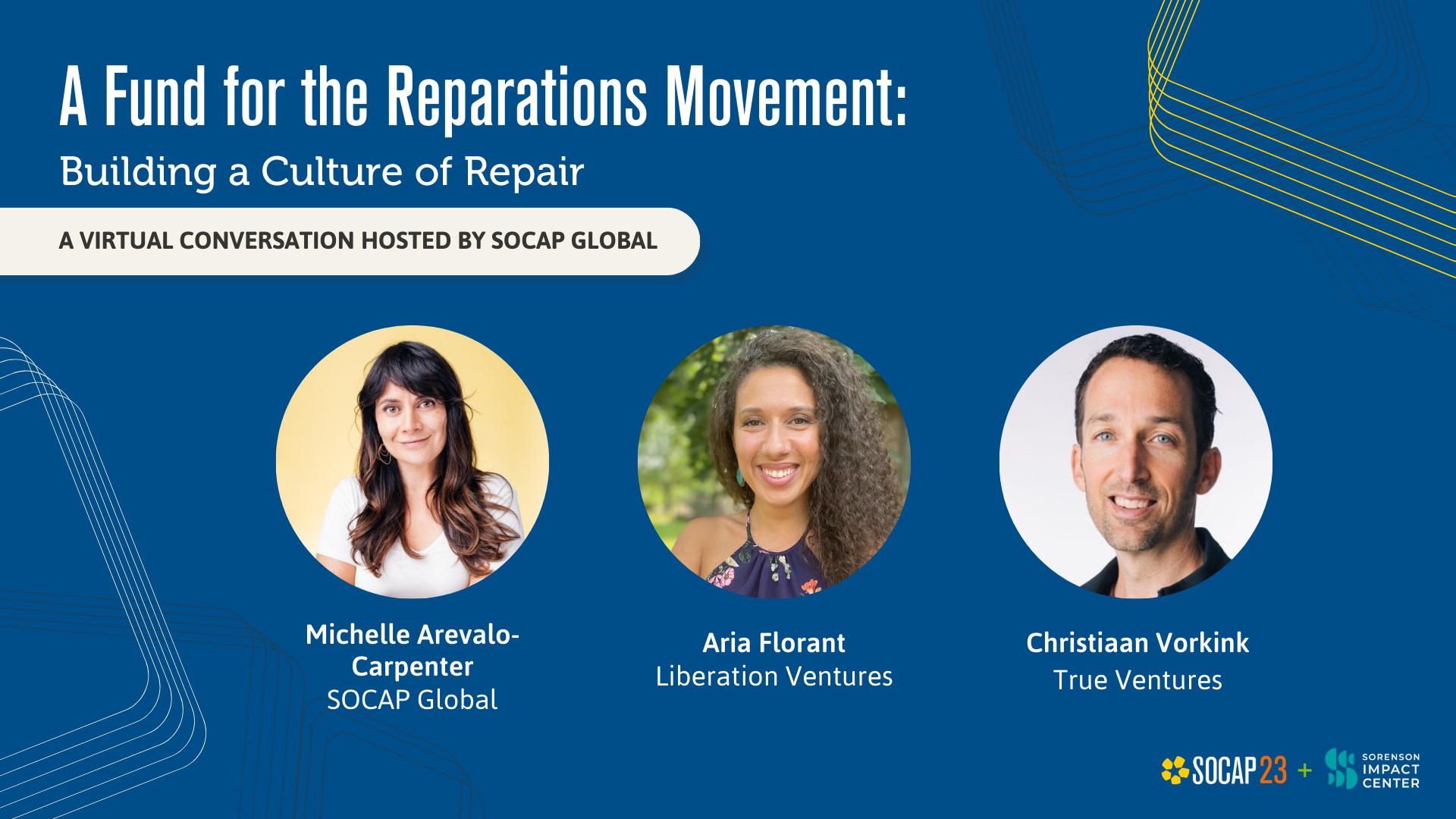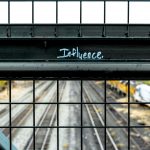A Fund for the Reparations Movement: Building a Culture of Repair
Reparations are gaining momentum in the U.S. as part of the movement for racial equity and justice. While some people define reparations as cash payments from the public sector for Black people, advocates for meaningful, systemic change seek a broader reparations framework.
Liberation Ventures is among those advocating for multi-dimensional reparations to help build a democracy that works for all people in the United States. At a SOCAP22 workshop, Aria Florant, Co-Founder and Managing Director of Liberation Ventures, shared the organization’s living framework for reparations. To help amplify this work, SOCAP recently hosted an online conversation featuring Florant and Christiaan Vorkink, VP and Director of True Ventures, which became an investor in Liberation Ventures thanks to the SOCAP22 session. Michelle Arevalo-Carpenter, Executive Director of Strategy and Content at SOCAP Global, moderated the conversation.
At Liberation Ventures, Florant and her colleagues are working to make racial repair a reality. Several years ago, the organization identified two primary obstacles to racial justice: the racial wealth gap and anti-Black narratives. “When we thought about what could be the solution, we came to reparations,” she said. “If reparations could really shock the system on those two anchors, then you would actually see positive ripple effects across systems, including education and health.”
By examining reparation efforts and processes around the world, Liberation Ventures developed a four-component framework to help create a cycle of racial repair. Florant explained each of the components:
- Reckoning: Learning and understanding the actions and systems that have caused harm.
- Acknowledgment: Voicing understanding that harm has been caused and giving harmed parties the opportunity to clarify or deepen understanding of the harm.
- Accountability: Taking ownership and responsibility for harm and committing to stop its causes.
- Redress: Taking action to catalyze community-level healing and create an equitable world in the future.
“A lot of people think that reparations are really about money in general. And as you can see from these four components, three of them are actually not about money,” Florant said. “This isn’t just an economic project; it’s really a political and cultural project. And it’s not just about the past; it’s also about the future.”
In its role as a field catalyst in the reparations movement, Liberation Ventures serves as a connector between on-the-ground groups and large philanthropies. “We help them become more than the sum of their parts and build momentum toward our North Star, which is comprehensive federal policy,” Florant said.
Liberation Ventures pursues three primary streams of work — grantmaking, capacity-building, and narrative change — to help support and amplify the reparations movement. “It really is important to be talking and reframing reparations to be more than just the money and instead be about building a multiracial democracy,” she said.
That message of long-term systemic resonated with Vorkink at SOCAP22 when he was part of the audience for the Liberation Ventures session. “I was struck by the emotion that came out of the conversation. I was struck by the depth of the conversation,” he said. “It really got the wheels turning.”
During 20 years as an early-stage venture capital firm based in the San Francisco Bay area, True Ventures has supported founders of movements and products “that can capture the imagination,” Vorkink said. “As we think about this year, what bolder movement could there be than attempting to address the greatest foundational and systemic flaw in American history?” he said. “As I talked to more people, as I did my best to educate myself about reparations and how we might be a thoughtful partner to Aria and her team, that led to more conversations. It’s been a wonderful relationship that began that day.”
Liberation Ventures is a strong example of the type of partnership that True Ventures seeks, Vorkink said. “What gets us excited, initially, is a powerful combination of a really incredible novel idea and then a founder or a group of founders that often have lived experience or some deep visceral belief that they are the right people to solve that problem or to move the needle on that problem,” he said. “Not only is this a huge problem that the world needs to solve, but also this is the right person or these are the right people to, in fact, do that.”
The vision and model that Liberation Ventures developed to address such a large challenge through practical steps made an impression on Vorkink and the True Ventures team. “Ideas alone are certainly important, but without the right protagonist, they will never reach their full potential,” he said. “We are already learning a lot from the way they do their work and the way they bring together their community to create change as well.”
Liberation Ventures outlines its vision for a culture of repair in a downloadable report.
Watch the full conversation:
Speakers:
Aria Florant, Co-Founder & Managing Director, Liberation Ventures
Christiaan Vorkink, VP & Director, True Ventures
Michelle Arevalo-Carpenter, Executive Director of Strategy & Content, SOCAP Global







